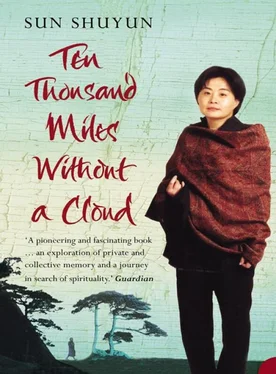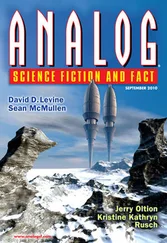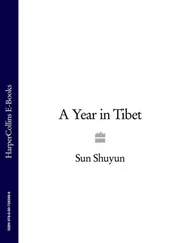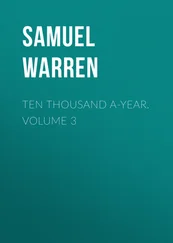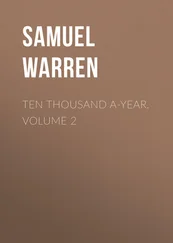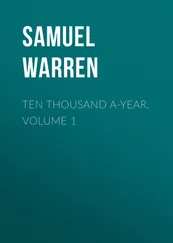When they came to a big space, they would stop for struggle meetings, like public entertainments, drawing huge crowds. One day I dragged my grandmother along to watch. The ‘cow demons’ and ‘snake spirits’, as they were called, walked slowly round in a circle; they were reviled and spat on and a Red Guard whipped them with a belt. Some of the dunces’ caps fell off. The wires of their heavy placards cut into their flesh. The loudspeakers on the truck shouted: ‘Down with the reactionaries! Let them taste the strength of the proletarian dictatorship! And let them be trampled on for eternity!’ We were informed they were the agents of feudalism, capitalism, American imperialism and Soviet revisionism, who dreamed of toppling the dictatorship of the proletariat. So everyone must be on guard and think of class struggle hourly, daily, weekly, monthly – never forget it! I was hopping up and down, trying to get a better view. Grandmother was leaning on an electricity pole, her face white as ashes. She turned to me, looked me in the eye and said I would go to hell if I ever treated people like that. ‘Don’t frighten me. There is no hell,’ I answered back. When it was getting dark, the Red Guards marched off, the ‘enemies’ gathered up their caps and placards, and with their heads lowered, walked slowly back home. Tomorrow they might be paraded again.
I remember asking Grandmother, how could those people possibly topple the government? I did not understand. The old, bald priests in their long dirty robes looked so frail, as if they could collapse any minute under their heavy placards. My grandmother said they were the gentlest of men – they walked very carefully so they would not tread on ants; and in the old days, when they lit a lamp, they would cover it with a screen so that moths could not fly into it. But my father said I should not be fooled by appearances. ‘Even a dying cobra can bite,’ he warned me.
It was a fun time for kids. Schools were often closed, and all the children from the compound I lived in played together; we made up a unit of our own and my older sisters joined in. We wore mini-versions of military tunics – Mother sewed them from an old uniform of Father’s, and put a belt round the waist. She said, ‘If they ask you, just say your father is in the army and you will be safe; nobody will dare to touch you.’
My sisters did not study much when they did go to school. Reading and writing, addition, subtraction – there was not too much of these. Books were burnt, school libraries set on fire. Students who rebelled against their teachers were good, they were role models. Handing in a blank exam paper was heroic. The teachers’ job was to groom the successors of Communism. If they did not, they were sent away to be ‘reeducated’. They had to instil the right ideas from day one. Better socialist weeds than capitalist seeds, illiterate rebels rather than educated pupils bent on scholastic achievement. What was the point of a brilliant mind that could not tell grass from wheat?
It was the same when I started school. We did not have many normal lessons; instead we learned from peasants and workers. ‘Eat with them, sleep with them, work with them.’ We served apprenticeships in factories, making simple tools, such as hammers and chisels – half the things we made were useless, but it did not matter. We were learning the right attitude. We went to the countryside at harvest-time, helping the farmers to bring in the wheat. At least we thought we were helping: in fact, we were in the way and the farmers worried they would be in trouble if we cut ourselves on their sickles; they had to feed us; and when they were worn out at night, they had to stay up lecturing us about the bitter past and the sweet life that the revolution had brought. We did reward them: every day we went out after lunch to collect animal droppings for them, and we took night-soil from the school cesspit to their fields. That taught us something.
Then life on the streets became fiercer. The Cultural Revolution had taken on a more sinister twist. It was ‘Smash the Old’ time. The Red Guards were in full spate, storming temples, demolishing pagodas, removing traces of capitalism – old shop signs, neon lights on top of department stores, even the rotating lights outside barber shops. They took down the old street signs, which normally had auspicious names in one form or another, and replaced them with ‘struggle’ themes. They patrolled the roads and stopped anyone with curly hair, high heels or tight trousers – they shaved their heads, broke the heels and cut the trousers open. There was a small temple near home: it was very familiar – Grandmother used to take me there. I liked it; at festival times there were paper lanterns and paper animals to entertain us. Now the temple was broken up and sealed off. Then the Red Guards began ransacking people’s homes, throwing out posters, record players, clocks, antique furniture, any books that were not by Mao or Marx and Lenin – everything was piled in the streets and sent up in flames.
In one of the piles Grandmother found something special for me. I was thrilled – it was a comic-strip version of a novel, The Monkey King. The front cover was gone and some pages were missing.
The Monkey King tells the epic story of a monkey, a pig and a novice accompanying a monk to India to seek sutras, sacred writings. The monk is utterly useless. He is kind and pious, but weak, bumbling and, as the Chinese say, with a mind as narrow as a chicken’s intestine. He cannot tell right from wrong. But it is reputed that eating his flesh will guarantee immortality, so demons and vampires are all out to get him. He is in luck though: soon after he sets off, he runs into the monkey, sent to help him by the Goddess of Compassion. Without the monkey, he would not stand a chance of saving his skin, let alone getting his job done. The monkey looks like any other, but he is far from ordinary. His eyes are the sun and the moon. He appeases his hunger with iron-pills and slakes his thirst with copper-juice. In one somersault he covers 180,000 leagues. Reciting a spell, he can turn himself into anything he desires: a cloud shrouding everything in darkness, an insect hidden in a peach, a giant so big that even hurricanes cannot blow him away. No weapon can harm him, and a contingent of 100,000 heavenly troops fails to catch him. Even alchemical fire cannot burn him. He is inviolable and he gives himself a fitting title – ‘The Great Sage, Equal to Heaven’. He is submissive only to the Buddha and the monk – whenever the monk recites a spell from a sutra, the monkey curls up and cries with unbearable pain. After eighty-one titanic battles the monkey finally finds the sutras and brings them back with the monk on a magic wind. The monk, the monkey, the pig and the novice all became Buddhas.
I showed the book to my father when he came back from work. ‘It is a good book,’ he said. ‘Chairman Mao loves it. He even wrote a poem about it: “The monk is confused but can be reformed; the vampire is vicious and must be killed. The golden monkey strikes with his cudgel, and Heaven is cleared of all evil. Welcome, welcome, Monkey King, for the battle against new demons.” ’
‘What are the sutras? Why did the monkey go all that way to get them? Are they like Chairman Mao’s Little Red Book ?’ I asked. I had heard adults use the word ‘sutra’ to describe the latest instruction from Chairman Mao.
‘Sutras are the words of the Buddha,’ my father told me.
‘Who is the Buddha? Is he like Chairman Mao, very important?’
Father was suddenly very irritated. ‘These are not things for children. You cannot understand them. And you mustn’t talk about them outside this house.’
Many Red Guards took Mao’s poem as their cue and called their factions ‘The Magic Cudgel’ or ‘The Golden Monkey’. Little did I know that they created more havoc and unleashed more terror than the monkey could have done.
Читать дальше
